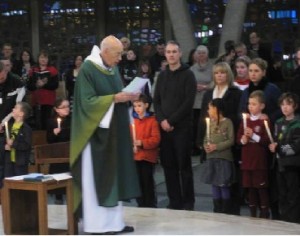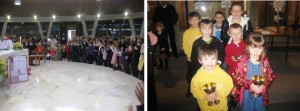Thank you for God, dedicating your life to God. Love.
Posted by Fr. JonathanJul 8
Last week was quite an unusual one for many of us in the Parish of St. Mary’s, Leyland. On Wednesday and Thursday, we said ‘Good bye’ to Bishop Ambrose, and the services then contained moments of beautiful liturgy, with strong feelings of thankfulness to God, for our relationship with the great man, all this imbued with a sense of loss. Two further funerals for Bishop Ambrose were to follow, at Newcastle and Ampleforth, on the ensuing Friday and Saturday. On Sunday 3rd July, there followed the Ruby Anniversary celebrations of my Priesthood. Somebody remarked they had likened the events to those of Holy Week – passion and death, preceding resurrection. Be that as it may, for me, it was most joyful, having many people gathered to celebrate my anniversary; my family had travelled good distances from Sussex, London and Cambridge, and they, together with other visitors from Liverpool and neighbouring parishes, very much added to the occasion.
 |
Fr. Ambrose and Some of the Children,
First Holy Communion Enrolment Mass, 2011
Bishop Seamus Cunningham presided at the Requiem Mass on Friday 1st July, at Newcastle. He pointed out, once again, that Bishop Ambrose had wanted his funeral to be a celebration of his life, and not a sad and mournful affair; and so it proved to be. For those with the facility, it is well worth- while going to the Website of the Hexham and Newcastle Diocese, to see the pictures, and hear the sermon of the former Vicar General of the Diocese, Canon Alex Barrass, who preached a beautiful sermon. Two things in particular stood out for me: firstly, Bishop Ambrose’s optimism and his positive outlook about life – he often used the words ‘absolutely splendid’ and ‘marvellous’ about events or situations, though he remained shrewd enough to know what was happening around him in the Diocese. To illustrate this, Fr. Barrass recounted a story of the Bishop visiting a priest who was going blind; he uttered the very same words when he told that father’s sight was liable to be lost – ‘absolutely splendid’, ‘marvellous’. This priest might have been somewhat disconcerted at this seemingly un-sympathetic remark: later, after losing his sight, he used to recount what Bishop Ambrose had said to him; at the same time, he remained much consoled by narrating the story! Secondly, Canon Barrass said that he had picked up from St. Mary’s Parish bulletin, how towards the end of his life, Bishop Ambrose was too weak to greet many people: “Fr. Ambrose is growing weaker but remains quite lucid. He is very happy to be here in Leyland for his last stages of his journey to the Father. He would like to greet each parishioner personally to thank you, and he sends his blessing to each person. He hopes that we will all meet merrily in heaven.”
At Ampleforth, on Saturday 2nd July, the Funeral Mass was a simple and dignified monastic Mass. It was striking that Fr. Abbot chose the very same readings that we had used for the Requiem, at Leyland, on Thursday 30th June. We had asked Fr. Ambrose about his choice of readings for his funeral, and after pausing for thought, not answering for a while, he replied that he would leave the choice to me. As Parishioners will know, I chose the blessing he shared with me, from Ephesians (3.14-21), and then, the last section of St. John’s famous last prayer of Jesus, in Chapter 17 of his Gospel, (verses 20–26). Repeating the words he had used at Leyland only days before, Fr. Abbot asked the people at Ampleforth, to take those two scripture texts and ponder them, because we should all be people of unity – nothing being more important than that – and that our inner selves should thereby be strengthened and so attain the same certain faith as Bishop Ambrose; in this way, and by God’s power, we should all be filled with the utter fullness of God.
 |
First Holy Communion Enrolment Mass, 2011
(Selected Writings from the Greetings of Some of These Children Form the Quite
Wonderful Jubilee Wishes Reproduced at the End of this Blog)
The Ruby Jubilee celebrations came as a kind of ‘resurrection’ after the sadness of parting from Bishop Ambrose. However, though different in character, it fitted in with that ‘sense of joy and thanksgiving’ that Bishop Ambrose wanted for his funeral. There was much joy and laughter. Fr. Egidio preached about the importance of mercy, a legacy given to him at his own ordination, by the future Pope John Paul I, the Bishop at that time, who ordained him. The future Pope assembled all the thirteen young candidates, together, the day before the ordination, and spoke to them in these words: “You are young and enthusiastic now. Do not be surprised if later on in your life you will feel the burden of human fragility in yourselves. Do not be surprised, depressed, unduly worried or shocked by this. We are all fragile human beings, and God will always show you his mercy to help and support you.” Fr. Egidio then told everyone he would be giving me a book, as his present to me, for my 40th – and the book, the ‘Diaries of Saint Faustina’, who was the Polish nun, canonised by Blessed John Paul II, because she was the saintly person who promoted this aspect of God – God’s infinite mercy. Fr. Egidio obviously saw that Popes, JP I and JP II, had a spiritual awareness, both as Popes, of the importance of Divine Mercy for our world. This has been my own reflection, also.
On Sunday, the sun was shining brightly: the celebration in Church was a ‘firework’ of joy, as was the shared lunch afterwards, in the garden, bathed in God’s sunshine. Children played, people chatted and ate and drank and the whole liturgy went on, smoothly, from Church to Garden. At this point, I want to thank, through the auspices of this blog, all who so generously gave me gifts of many different kinds – all of them so greatly appreciated – and the words on the many cards I received, not to mention the large gift of money, of over £1500! Somebody asked how I hoped to spend it, and, at this moment in time, I am hoping to ask Fr. Abbot, his permission to go on an ecumenical pilgrimage to the Holy Land, next year in March, organised by an Anglican friend from the Focolare Movement. I have had the grace and privilege to go once to the Holy Land; if granted, I hope this second visit may be even better than the first.
The young children gave me their presents, and these touched my heart, deeply: one was from those who attend little Church, and two others were received from St. Anne’s and St. Mary’s Primary Schools. The words the children wrote bring this blog to an end, no doubt because great wisdom comes from the hearts and minds of young children; clearly, they had not been instructed or told what to write – these thoughts came from them – from their hearts. There are some pictures alongside the texts; some of the nicest are of me on my ‘bike’ riding around Leyland, some of me vested ready for Mass.
“To Father Jonathan: thank you for going to be a priest”
“To Father Jonathan: thank you for helping with my holy communion, love xxx
“Dear Farther Jonathan, thank you for all your hard work in Church for 40 years”
“I love Church, Love”
“Thank you for baptising me. Thank you for being kind. Thank you for looking after my mummy. Lots of Love from xxx”
“I am very happy that you believe in God”.
“Is it good being a priest?”
My answer to this last is: “It is very good being a priest. Why? Because God becomes very close to you; you feel his Love and He is your best friend; you realise that God has given you a very loving family – rather a large one – because the priest becomes a part of the family of all those parishioners, and other people, he gets to know in a close way. Thus, God himself is not only close, but a priest also loves many people and many people come to love the priest. Everyone needs to feel they are loved; correspondingly, each of us needs to love others. This Love is given to a priest, to anyone who follows Jesus, hundreds of times more than somebody who does not follow Jesus. So, it is good being a priest; but, remember, anyone can follow Jesus!”
“God bless you!”
“Happy anniversary. I hope you have lots of fun”.
The final one is special because it brings all glory to God, and that is as it ought to be.
“God made this (picture of a cross). Thank you for God, dedicating your life to God. Love”
In e-mailing the blog, ‘Word Press’ tends to distort the original formatting of the document. Readers may wish to visit the website www.stmarysblog.co.uk to read it in its original format.

No comments